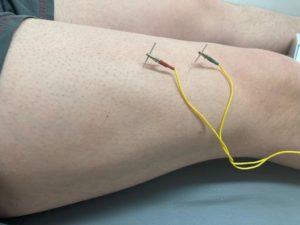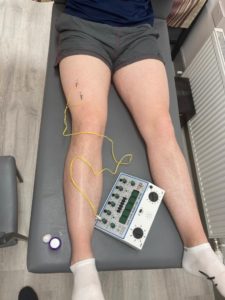To Needle or not to Needle??….. Everyone is doing it! But is dry needling right for you?
Deep Dry needling (DDN) is a form of therapy in which fine needles are inserted into muscle knots (muscle trigger points) to stimulate a healing response and encourage muscle release. research. This stimulates increased blood flow and brings oxygen and nutrients to the muscles which has the effect of reducing muscle trigger points by releasing the noxious chemicals causing them. This is turn decreases pain and improves function.
Often a local twitch response is experienced and this is a good sign as it is what the Physiotherapist is looking for. It means the trigger point has been stimulated, which helps the muscle relax. When this local twitch response occurs, a brief painful response may be experienced but it does not last for more than a second.
Dry needling is a modern, scientific based intervention for the treatment of pain and dysfunction in muscles, tendons and ligaments.
The physiotherapists here at Kilkenny Physiotherapy Clinic have undergone further training in deep dry needling. We use safe procedures, sterile single use needles and are trained in all safety precautions.
As with any treatment, there may be some mild side effects including bruising, swelling, increased spasm 2-24hrs and short term nerve irritation.
Very rare side effects can include allergic reaction, infection, fainting/dizziness and penetration of visceral organ.


What can be treated by Deep Dry Needling?
DDN can be used to treat muscle strains, back and neck pain, tendonopathies, muscle tightness/cramps, headaches, plantarfasciopathy, shoulder pain, arm pain, buttock pain and leg pain.
*This is not an exhaustive list – deep dry needling can be highly effective in the treatment of a wide variety of pains and injuries.

How does Deep Dry Needling differ from Acupuncture?
The main difference between DDN and acupuncture is the theory and reasoning behind them. Acupuncture is based on Chinese theory – Meridians, balance of Yin and Yan, energy flow etc.
In contrast, DDN is a western based and widely researched technique. It is based on a theory of chemical build up in muscle trigger points (muscle knots).
Although the techniques are similar, the physical outcome differs hugely.
The main similarity between the two techniques is the use of very fine, sterile and flexible needles.


